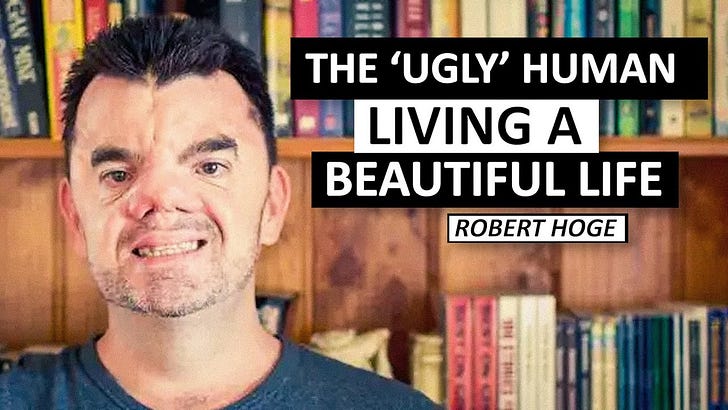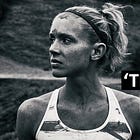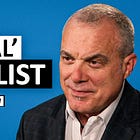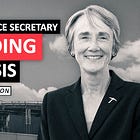How to Generate Better Ideas, Master the Art of Suffering, and Design a Beautiful Life
How to Generate Better Ideas, Master the Art of Suffering, and Design a Beautiful LifeThis edition contains 13 practical lessons you can learn from bestselling author James Clear, NFL Legend JJ Watt, U.S. Air Force Secretary Heather Wilson, and more.With Thanksgiving approaching, I hope you're finding time to relax and read (and hopefully improve your content diet). I recently revisited the fascinating people I've interviewed for The Profile over the years. You may have missed some of these conversations, so I wanted to share them with you this holiday season. (If you prefer to listen, you can check out The Profile’s podcast page here.) These interviews contain insights and ideas that I believe you'll find valuable. I've organized them by each person's key lessons, along with my reflections on how their wisdom has shaped my own life: 1. Robert Hoge on how to design a beautiful lifeOut of all my interviews in my entire career, this one has probably been the most impactful. Robert Hoge was born with a large tumor in the middle of his face that pushed his eyes to the sides of his head and two severely mangled legs. His mom refused to take her baby home because she was worried about how his difficult upbringing would affect her other children. When she and her husband returned home without their newborn child, his mom kept second-guessing her decision. So she decided to give her kids a say. During a family meeting around the dinner table, she asked them to take a vote on whether they wanted Hoge to join the family. His siblings all voted that they wanted his parents to bring him home. In the beginning of our interview, Hoge pulled out the journal that his mom kept in the first days of his life. In it, she wrote, “I wished he would go away or die or something. I just wanted to be finished with it all.” After he read me a few passages from it, I asked, “What did you make of these words as you were growing up, and what do you make of them today?” What he told me is something that has almost become a mantra for me: “Not everything has to be okay, all at once.”
Check out the full interview here: Enjoying this? For more like this, make sure to sign up for The Profile here: 2. James Clear on how to generate better ideasWhen I interviewed Atomic Habits author James Clear, I wanted to know the following: How did Clear build his brand? Why did he write a book? What mental frameworks does he use to generate ideas? And of course, what lessons could he share about how we can be more intentional about our day-to-day behavior? One of the insights that’s stayed with me long after our interview centers around idea-generation. He said it’s about optimizing your digital and physical environment:
Check out the full interview here: 3. Amelia Boone on how to master the art of sufferingDubbed “The Queen of Pain,” Amelia Boone is a corporate attorney at Apple by day and an obstacle endurance racer by night. She signed up for her first Tough Mudder race at age 28 when she realized she couldn’t do a single pull-up. Since that day, she became obsessed with getting stronger and went on to become a 4-time world champion and one of the most decorated obstacle racers in history — all while working full-time at Apple. What fascinated me about Boone’s story is just how good she is at getting through pain. "When you put yourself through situations that are very hard, and you do that on purpose, it helps you to deal with the messiness in life that is not voluntary," she says. The lesson I learned from Boone is this: The bad things in your life are just like the good — they are temporary. And that’s freeing. Here’s what she said about the power of voluntary suffering:
Check out the full interview here: 4. Laura Dekker on how to parent children with big dreamsLaura Dekker holds the world record for being the youngest person to sail solo around the world. She began her journey in August 2010 when she was 14 years old and finished in January 2012 when she was 16. At age 16, she became the youngest sailor ever to single-handedly circumnavigate the globe. “For me, [that trip] was really the beginning of my life,” she told me. “And honestly, everything I have now has everything to do with that trip. It changed my life very significantly.” One of the most interesting parts of our conversation centered around the role of parenting children with big dreams. I asked her whether she would let her own kids undertake a similar endeavor. She said, “This is such a tough question. I would honestly sh*t my pants. I really hope they won't.” That was surprising for me to hear given how much freedom her parents gave her. Here’s what she said:
5. Mark Bertolini on how to lead with compassionIn his early career, former Bridgewater co-CEO and Aetna CEO Mark Bertolini was unapologetically competitive, aggressive, and at times, ruthless. He was so well known for his bare-knuckled, iron-fist leadership that his employees had given him the moniker, "Darth Vader.” By all measures, he had made it. He was making tons of money, living in a mansion, and earning respect in his field. But it came at a cost. He was spending more and more time away from his family, and inadvertently creating a work culture that didn't necessarily reflect his values. Then came his first wake-up call. In 2001, his son Eric was diagnosed with a rare and deadly form of lymphoma. Bertolini left his job as an executive at insurer Cigna to care for his son and donated one of his kidneys to him in 2007. Today, his son is the only known survivor of the disease. Bertolini joined Aetna in 2003, and one year later, experienced his second life-altering moment. Skiing in Vermont, he looked over his shoulder for a second when he hit a tree and dove headfirst into a river. He spent two hours in the icy water, having broken his spine in five places and ending up in coma. The injury resulted in his left arm being permanently disabled with throbbing, shooting pain. "During the recovery, I’m on seven different narcotics all at once," he says. "Fentanyl patches, Vicodin, OxyContin, Neurontin, Keppra. And liberal use of alcohol when I didn’t have to go anywhere. It was a mess." He said the two personal experiences made him realize the U.S. healthcare system isn't equipped to help patients recover properly after facing a major health issue. He began to define "health" broadly — a healthy individual is a productive individual, which in turn, is a happy individual. To better manage his pain without the help of painkillers, Bertolini turned to yoga and mindfulness. He began reading the Upanishads and the Bhagavad Gita, studying Sanskrit, attending yoga retreats, and learning chants. As the CEO of Aetna, Bertolini began making leadership changes from within. While the company was thriving, its employees were not, many of them using Medicaid and food stamps. He revamped employee benefits that included a minimum wage increase to $16 an hour and implemented yoga and meditation classes. Bertolini learned his most important leadership lesson after he began studying Eastern religions. He was inspired by a passage from the foundational Taoist text, the Tao Te Ching, attributed to philosopher Lao Tzu. Bertolini thought about how he could apply it to business leadership. He came up with ‘The Four Levels of Taoist Leadership.’ Here’s how he described it:
Check out the full interview here: 6. Heather Wilson on how to make difficult decisions in moments of crisisOn Nov. 5, 2017, a gunman entered a Texas church and opened fire, killing 26 people in the largest mass shooting in the state’s history. Heather A. Wilson, who was the Secretary of the Air Force at the time, witnessed the tragic unfolding of events, and then got a call from the Inspector General. He told her that he thought the shooter was a former airman who had been discharged. “We found out that not only had he been an airman who had been discharged, but that under the law, the Air Force should have notified law enforcement and put him on a list that prohibited him from purchasing a weapon — and we failed to do that,” she told me. As the Secretary of the Air Force, Wilson had to make a decision on how to handle this. One of the lawyers around the table suggested that she mitigate risk by issuing a statement with general language that told the public the Air Force is looking into it. Wilson didn’t like that suggestion. “We know what the truth is,” she said. “We’re much better off owning up to what we know and fixing it than trying to suggest that we’re further evaluating and investigating it. We were much better off just owning up to it and fixing the problem.” Someone else chimed in with another suggestion: “Blame it on your predecessor.” But Wilson was resolute. She would take responsibility and go on to work with the FBI to fix the underlying record system to prevent mistakes such as this one from happening again. She then told me something that has served me well when I’ve been in situations in which the advice didn’t feel right. Wilson said:
Check out the full interview here: 7. JJ Watt on how to fight complacencyOn Dec. 27, 2022, JJ Watt, one of the one of the NFL's most well-respected defensive stars, sent the tweet that would mark the end of one chapter and signal the beginning of another. At age 33, Watt announced he would retire from the NFL after 12 seasons. Even though football has been the dominant focus for the majority of Watt’s life, he has made a name for himself outside of the game. He earned national attention for his philanthropic efforts when he raised more than $41 million to help Houston recover from Hurricane Harvey. He dabbled in entertainment after hosting Saturday Night Live in 2020. And most importantly, he became a dad — one of the most monumental events of his life so far. One thing that is perhaps most impressive about Watt is that he never let complacency erode his career. During our interview, I asked him how. How do you fight complacency when you’ve had a taste of success? He told me something interesting: You see complacency rear its head at many different points. The more interesting part, he says, is not when it happens but when players realize it’s happening. Here’s what he said:
Check out the full interview here: 8. Brandon Stanton on how to find your focusBrandon Stanton is part street photographer, part storyteller. He's spent the last 10 years of his life capturing the fascinating stories of ordinary people. He catches his subjects in various moments of time — from their most vulnerable to their most philosophical. His popular blog, Humans of New York (HONY), features portraits of strangers who share intimate stories of strength, addiction, redemption, regret, and love. It all began in 2010. Recently fired from his finance job, Stanton picked up a camera and hit the streets. His initial goal was to photograph 10,000 New Yorkers and plot the pictures on a map of the five boroughs. He eventually began to interview his subjects and include a quote alongside their portraits. Stanton's photography project eventually evolved into a loyal following of more than 25 million followers on social media. When I interviewed Stanton, I asked him about the power of discipline and consistency. He had picked up his camera day after day, year after year for over a decade. Here’s what he said:
Check out the full interview here: 9. Danny Meyer on how to take risks without the fear of failureUnion Square Cafe. Gramercy Tavern. Shake Shack. Danny Meyer doesn't open restaurants. He opens institutions. As one of New York City’s most legendary restaurateurs, Meyer says his role is to challenge his team to think long-term even during the short-term turbulence of the chaotic event they have to face. One of the most remarkable things about Meyer is that he’s mastered the art of consistent innovation. He often tells his team: “Make new mistakes every day. Don’t waste time repeating the old ones.” In an industry that requires a certain level of consistency and perfectionism, how does Meyer encourage his team to experiment and take risks often without the fear of failure? Here’s what he said:
Check out the full interview here: 10. Lynsey Addario on how to see the beauty in the face of tragedyOver the past 15 years, war photographer Lynsey Addario has covered every major conflict and humanitarian crisis on the planet. As she sees the destruction and the pain through the lens of her camera, her images translate that intense emotion to people across the globe. Addario had a number of close calls on the job — she has been kidnapped in Libya, abducted in Iraq, and injured in a car accident in Pakistan. But the one consistent thread throughout Addario’s career is that she never puts the camera down — even in the face of extreme danger. If there’s one lesson she’s learned about the human experience it’s that no matter what is going on in the world, life goes on. Even in the midst of war, Addario shows scenes of people celebrating birthdays, weddings, and graduations. “It’s human nature to try to have fun, to laugh, to have some normalcy despite the disruptiveness and the devastation that war brings,” she says. “People try to find some semblance of routine, peace, and happiness. I see those moments over and over in war, and it’s always surprising to me, but it always gives me this reassurance. At the end of the day, we are all so similar.” In her memoir, she wrote: “I choose to live in peace and witness war—to experience the worst in people but to remember the beauty.” I asked her: How do you find beauty in the middle of a war zone? She said:
Check out the full interview here: 11. Rob Henderson on how to measure fulfillment“My name is Robert Kim Henderson. Each of my three names was taken from a different adult … These three adults have something in common: All abandoned me.” This is the powerful opening to Henderson’s new memoir, Troubled: A Memoir of Foster Care, Family, and Social Class. Needless to say, Henderson’s early life was turbulent. “Robert” was the name of his biological father, who abandoned him and his mom when Henderson was just a baby. “Kim” was his birth mother’s family name. She succumbed to drug addiction soon after Henderson was born, and he hasn’t seen her since he was a toddler. “Henderson” is the last name of his adoptive father, who severed ties with him after he divorced his adoptive mother. Divorce, tragedy, poverty, and violence dominated Henderson’s adolescence, but you would never know this from looking at his resume. He joined the Air Force at 17, went to Yale for undergrad, and earned a PhD at Cambridge. During our interview, I asked Henderson how he defines success. Truthfully, I expected him to respond with something about starting at the very bottom and reaching the very top. To my surprise he answered with this:
How incredible is that? More often than not, the things we take for granted are the very thinks we should thank our lucky stars for. Check out the full interview here: 12. Joe Preston on how to make time for recoveryJoe Preston, a New Balance lifer who was named CEO in December 2018, has been hyper-focused on cutting-edge innovation and making the brand relevant to a younger demographic. He’s expanded the brand into new sports, invested in the growth of its online business, and opened an innovative multi-sport research lab called “The Track” in Boston. And his bets are paying off. New Balance ended 2023 with annual sales of $6.5 billion, and Preston has set an audacious goal of becoming a $10 billion business within a few years. But in order to stay creative, he’s had to devote lots of time to work on creative projects and generate new ideas. Here’s what he said about the power of recovery:
Check out the full interview here: 13. Francis Ngannou on why you should bet on yourself todayAs a child growing up in Cameroon, former MMA champion Francis Ngannou endured a level of poverty few people can even imagine. After his parents divorced, he moved to his grandmother’s one-room brick house with his mom and four siblings. At age 9, Ngannou got a job digging sand mines for $1.90 per day. The work kept his body busy, but he kept his mind even busier by daydreaming of making it to America and becoming a world-famous boxer. This may sound like childhood fantasy, but Ngannou felt the reality of it in his bones. He was so obsessed with this dream of moving to the United States that he gave himself a nickname — “American Boy.” When he was 22, Ngannou was ready to execute on the plan that had percolated in his head for over a decade. “I left the village to go to the city and find a gym,” he says. “I wanted to be a world champion.” Even though he was a dreamer, Ngannou says he was realistic about the fact that he couldn’t become a world champion by training in Cameroon. So at age 25, he sold all of his belongings and set off for Morocco, the first leg of a winding and treacherous journey to America. Ngannou traveled a whopping 3,000 miles across the Sahara Desert — from Cameroon to Nigeria, from Nigeria to Niger, from Niger to Algeria, from Algeria to Morocco. “The biggest deal was to get from Morocco to Spain because Spain is in Europe,” he says. “That was the hardest part.” It took him 14 months to make it from Morocco to Spain, an endeavor Ngannou describes as “a hell of a journey.” That’s because he attempted to float on a raft full of people to a Spanish island off the coast of Morocco where he could call the Red Cross and seek asylum. But authorities had pulled him out of the water six separate times, and either dropped him back in the middle of the Moroccan desert or temporarily locked him in a Moroccan jail. He got through this chaotic journey with a laser-focused mindset, asking himself time and time again: “What do I have to lose?” Ngannou ardently believed that this temporary pain was necessary in order for him to change the trajectory of his life. In 2013, 26-year-old Ngannou made it to Spain, and spent time at an immigration detention center, but he didn’t care — asylum was all but guaranteed. In his search for a boxing gym, he ended up in Paris where he slept in the stairwell of a covered parking lot. "The parking lot was so nice," he said. "I didn't even feel homeless.” When he entered the gym, Ngannou caught the eye of coach Didier Carmont, who suggested Ngannou try mixed martial arts as a way to make a living before trying his hand at professional boxing. The rest is history. In 2015, Ngannou signed with the UFC, moved to the United States, and became the world heavyweight champion in a sport he didn’t even know existed just several years prior. When I interviewed him, one thing was clear: He is someone who deeply believes in himself and isn’t afraid to take risks. He knows the power of betting on himself time and time again. When something goes wrong in my life, I think about his story and what he told me about starting over: “Sometimes, to jump farther, you have to step back.” He told me:
Check out the full interview here: — There are even more interviews you can check out here: Invite your friends and earn rewardsIf you enjoy The Profile, share it with your friends and earn rewards when they subscribe. |
Older messages
The Profile: The most powerful person in AI & the Gen Z influencer making Wall Street more accessible
Sunday, November 17, 2024
This edition of The Profile features Martha Stewart, Jensen Huang, Sydney Sweeney, and more. ͏ ͏ ͏ ͏ ͏ ͏ ͏ ͏ ͏ ͏ ͏ ͏ ͏ ͏ ͏ ͏ ͏ ͏ ͏ ͏ ͏ ͏ ͏ ͏ ͏ ͏ ͏ ͏ ͏ ͏ ͏ ͏ ͏ ͏ ͏ ͏ ͏ ͏ ͏ ͏ ͏ ͏ ͏ ͏ ͏ ͏ ͏ ͏ ͏ ͏ ͏ ͏ ͏ ͏
The Profile: The Ozempic capital of the world & America's favorite motivational guru
Sunday, November 10, 2024
This edition of The Profile features Mel Robbins, Mike Tyson, “Dr. Roxy,” and more. ͏ ͏ ͏ ͏ ͏ ͏ ͏ ͏ ͏ ͏ ͏ ͏ ͏ ͏ ͏ ͏ ͏ ͏ ͏ ͏ ͏ ͏ ͏ ͏ ͏ ͏ ͏ ͏ ͏ ͏ ͏ ͏ ͏ ͏ ͏ ͏ ͏ ͏ ͏ ͏ ͏ ͏ ͏ ͏ ͏ ͏ ͏ ͏ ͏ ͏ ͏ ͏ ͏ ͏ ͏ ͏ ͏ ͏ ͏
9 Techniques to Help You Become a ‘Master of Disaster’ in Any Crisis
Thursday, November 7, 2024
This is a deeply-reported, practical guide on crisis management. ͏ ͏ ͏ ͏ ͏ ͏ ͏ ͏ ͏ ͏ ͏ ͏ ͏ ͏ ͏ ͏ ͏ ͏ ͏ ͏ ͏ ͏ ͏ ͏ ͏ ͏ ͏ ͏ ͏ ͏ ͏ ͏ ͏ ͏ ͏ ͏ ͏ ͏ ͏ ͏ ͏ ͏ ͏ ͏ ͏ ͏ ͏ ͏ ͏ ͏ ͏ ͏ ͏ ͏ ͏ ͏ ͏ ͏ ͏ ͏ ͏ ͏ ͏ ͏ ͏ ͏ ͏ ͏
The Profile: Hollywood’s most bankable writer & the billionaires buying Montana’s mountains
Sunday, November 3, 2024
This edition of The Profile features Ben Mezrich, Marissa Mayer, and others. ͏ ͏ ͏ ͏ ͏ ͏ ͏ ͏ ͏ ͏ ͏ ͏ ͏ ͏ ͏ ͏ ͏ ͏ ͏ ͏ ͏ ͏ ͏ ͏ ͏ ͏ ͏ ͏ ͏ ͏ ͏ ͏ ͏ ͏ ͏ ͏ ͏ ͏ ͏ ͏ ͏ ͏ ͏ ͏ ͏ ͏ ͏ ͏ ͏ ͏ ͏ ͏ ͏ ͏ ͏ ͏ ͏ ͏ ͏ ͏ ͏ ͏
The Profile: The son trying to live up to his father’s NBA legacy & the fentanyl vaccine that would prevent overdo…
Sunday, October 27, 2024
This edition of The Profile features Bronny James, Will Taylor, and others. ͏ ͏ ͏ ͏ ͏ ͏ ͏ ͏ ͏ ͏ ͏ ͏ ͏ ͏ ͏ ͏ ͏ ͏ ͏ ͏ ͏ ͏ ͏ ͏ ͏ ͏ ͏ ͏ ͏ ͏ ͏ ͏ ͏ ͏ ͏ ͏ ͏ ͏ ͏ ͏ ͏ ͏ ͏ ͏ ͏ ͏ ͏ ͏ ͏ ͏ ͏ ͏ ͏ ͏ ͏ ͏ ͏ ͏ ͏ ͏ ͏ ͏ ͏
You Might Also Like
Discover a preview of the content keeping Digiday+ members ahead
Thursday, February 27, 2025
Digiday+ members have more ways than ever to stay ahead of the news and trends transforming media and marketing. Explore premium content from our editors below, including weekly briefings, research and
See you in Boston?
Thursday, February 27, 2025
...back in person for the first time since 2019! Exploding Topics Logo Presented by: Semrush Logo You follow Exploding Topics because you want to get an edge on your competition. Now take that
Why I'm doubling down on my community in 2025... (free bonus)
Thursday, February 27, 2025
Hi there 2025 is chugging along (it's almost March!) – and there's a ton going on right now. But there's something that hasn't changed. Your agency still needs a constant stream of new
Programmer Weekly - Issue 243
Thursday, February 27, 2025
February 27, 2025 | Read Online Programmer Weekly (Issue 243 February 27 2025) Welcome to issue 243 of Programmer Weekly. Let's get straight to the links this week. Streamline IT management with
🎙️ New Episode of The Dime China Tariffs & The Next Era of Vapes: Impact on Supply Chains & Brands ft. Nick Kovacevich
Thursday, February 27, 2025
Want to be featured on The Dime Podcast? Scroll to the end of this email to find out how. Listen here 🎙️ China Tariffs & The Next Era of Vapes: Impact on Supply Chains & Brands ft. Nick
80% less time on social reporting sound good?
Thursday, February 27, 2025
Get Forrester's Total Economic Impact™ of Sprout. ͏ ͏ ͏ ͏ ͏ ͏ ͏ ͏ ͏ ͏ ͏ ͏ ͏ ͏ ͏ ͏ ͏ ͏ ͏ ͏ ͏ ͏ ͏ ͏ ͏ ͏ ͏ ͏ ͏ ͏ ͏ ͏ ͏ ͏ ͏ ͏ ͏ ͏ ͏ ͏ ͏ ͏ ͏ ͏ ͏ ͏ ͏ ͏ ͏ ͏ ͏ ͏ ͏ ͏ ͏ ͏ ͏ ͏ ͏ ͏ ͏ ͏ ͏ ͏ ͏ ͏ ͏ ͏ ͏ ͏ ͏ ͏ ͏ ͏
Social proof in email marketing, National Toast Day, and the art of CTAs
Thursday, February 27, 2025
The latest email resources from the Litmus blog and a few of our favorite things from around the web last week. ͏ ͏ ͏ ͏ ͏ ͏ ͏ ͏ ͏ ͏ ͏ ͏ ͏ ͏ ͏ ͏ ͏ ͏ ͏ ͏ ͏ ͏ ͏ ͏ ͏ ͏ ͏ ͏ ͏ ͏
Python Weekly - Issue 688
Thursday, February 27, 2025
February 27, 2025 | Read Online Python Weekly (Issue 688 February 27 2025) Welcome to issue 688 of Python Weekly. We have a packed issue this week. Enjoy it! The #1 AI Meeting Assistant Summarize 1-
Free download: 5 ways to improve your proposals
Thursday, February 27, 2025
A free resource for you ͏ ͏ ͏ ͏ ͏ ͏ ͏ ͏ ͏ ͏ ͏ ͏ ͏ ͏ ͏ ͏ ͏ ͏ ͏ ͏ ͏ ͏ ͏ ͏ ͏ ͏ ͏ ͏ ͏ ͏ ͏ ͏ ͏ ͏ ͏ ͏ ͏ ͏ ͏ ͏ ͏ ͏ ͏ ͏ ͏ ͏ ͏ ͏ ͏ ͏ ͏ ͏ ͏ ͏ ͏ ͏ ͏ ͏ ͏
From living in a car to $1.4M in 5 months
Thursday, February 27, 2025
I love that you're part of my network. Let's make 2025 epic!! I appreciate you :) Today's hack From living in a car to $1.4M in 5 months Taro Fukuyama and 2 of his friends from Tokyo
